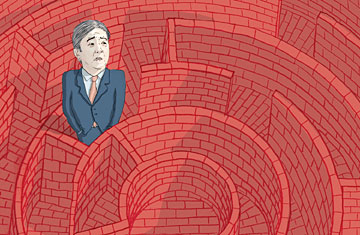
(3 of 3)
Certainly the Japanese people have every right to put their own stamp on a constitution that was, after all, effectively written for them by an occupying power. But revision, which requires a two-thirds majority in the Diet, will take years to accomplish. Expending that kind of energy on a constitutional issue while the opposition DPJ focuses on bread-and-butter economic matters doesn't make a lot of political sense in an election year. "What should politicians do now?" DPJ head Ichiro Ozawa asked in the Diet last month. "Amend the constitution or improve people's lives?"
Abe has also been hurt by the ideological approach he has taken to education reform, an issue that does resonate with voters. This year more 12-year-olds than ever before took entrance exams for selective private and national high schools, their parents desperate to remove them from a dysfunctional public-education system. While conservatives worried about declining academic performance and motivation, a highly publicized string of student suicides last fall showed the extent to which bullying had poisoned Japan's classrooms.
Abe's answer? Revise the fundamental education law to allow for greater emphasis on patriotism. Although a council he convened last month released more detailed recommendations, including increasing total class time, critics aren't impressed. Abe "doesn't address the real problems that Japan's education system faces," says the SDP's Fukushima, who notes that Japan still spends considerably less per student on public schooling than the O.E.C.D. average—forcing parents to plug the gap by sending their kids to private schools if they can afford to do so.
In coming years, Japan will need a better-educated, more productive population if it is to defuse its demographic time bomb. Japan's working population is projected to decline from 66 million to 55 million by 2035. This year the first of Japan's 7 million baby boomers will hit retirement age. If nothing is done to alter the equation, a shrinking supply of workers will struggle to support a growing number of retirees, while Japan's national debt means the government may be unable to provide a strong safety net. "People have lost confidence in the pension system," says Diet member Kono, who connects this fear to depressed consumer spending.
Abe has urged Japanese women to have more children (the current fertility rate is 1.29 children per woman), appealing to traditional family values while also promising to boost child-care support. But his administration has still managed to appear insensitive and out of touch on the issue. In a Jan. 27 speech exhorting them to have more children, Health Minister Hakuo Yanagisawa referred to Japanese women as "baby-making machines." The minister quickly apologized, but Abe's critics seized on the incident—and on Abe's refusal to fire Yanagisawa—as evidence that the administration can't handle the demographic issue. "The Health Ministry deals with grave fundamental social issues like the decreasing population," says Yoshiaki Takaki, the DPJ's Diet policy chief. "We cannot accept that it is headed by someone who has demonstrated a complete lack of respect for people."
In reality, even a more politically deft government would be unable to raise Japan's birthrate enough to make a dent in the demographics. And that puts pressure on the Prime Minister to figure out a more creative way to augment the country's declining workforce, not least by promoting immigration, expanding labor participation by women and the elderly and improving worker productivity through innovation. Abe clearly recognizes that this has to be a priority. In his campaign book, Towards a Beautiful Country, he writes that Japan should be "seen by people around the world as a place where they want to come and work." In a Jan. 26 policy speech to the Diet, Abe announced that by May he would lay out "Innovation 25," a blueprint for Japanese R&D through 2025. But he has yet to unveil the concrete details that turn intentions into policy. "These are good ideas," says Takenaka, the former Koizumi minister. "But how is his agenda actually going to work?"
Ironically, the area where Abe has made genuine progress is the one that critics were most afraid he would mishandle: foreign affairs. Abe has quickly managed to rebuild Japan's fractured relationships with South Korea and China, traveling to both capitals for lightning summits less than two weeks after he took power. While Koizumi continually irritated his neighbors by visiting the controversial Yasukuni Shrine, which honors Japan's war dead, Abe tactfully sidestepped the issue by refusing to say what he intends to do about Yasukuni. "He's shown real success in dealing with this," says Koichi Kato, an LDP heavyweight who has been critical in the past of Abe's nationalist leanings.
Abe's advisers know that diplomatic successes play well in foreign op-ed pages. But they also realize the Prime Minister must begin to show that he can address the pain Japanese voters are feeling at home—while reassuring a worried LDP that he can still lead the party to victory in the crucial July elections. In recent weeks there has been disquieting dissension within the Prime Minister's own Cabinet. Abe has had to rein in his Defense Minister and Foreign Minister over remarks both men made that were critical of the U.S., Japan's key ally. The diplomatic damage was relatively light, but the controversies reinforced the perception that Abe was losing influence. Still, his allies insist he will turn things around. "Abe will demonstrate the leadership to push his ideas forward," says Nakagawa, the LDP secretary-general. "This is his time." If he fails, the Abe era may be measured in months, not years—and Japan will lose a valuable opportunity to prepare for the challenges that lie ahead.
